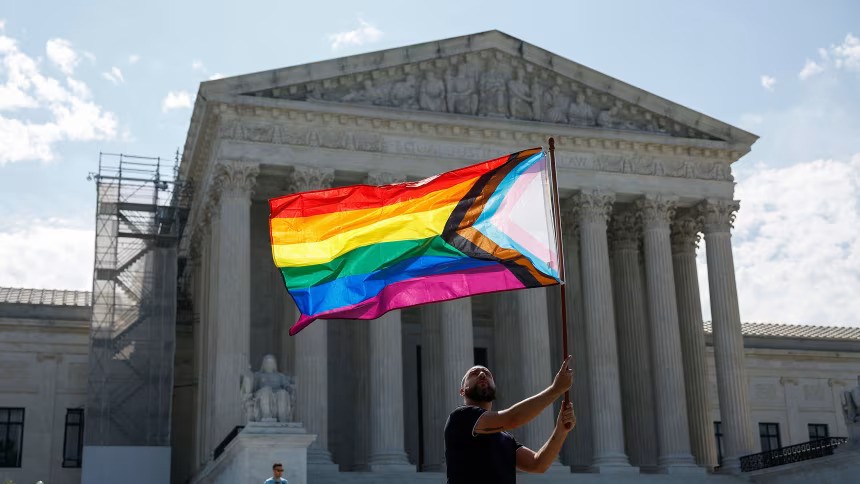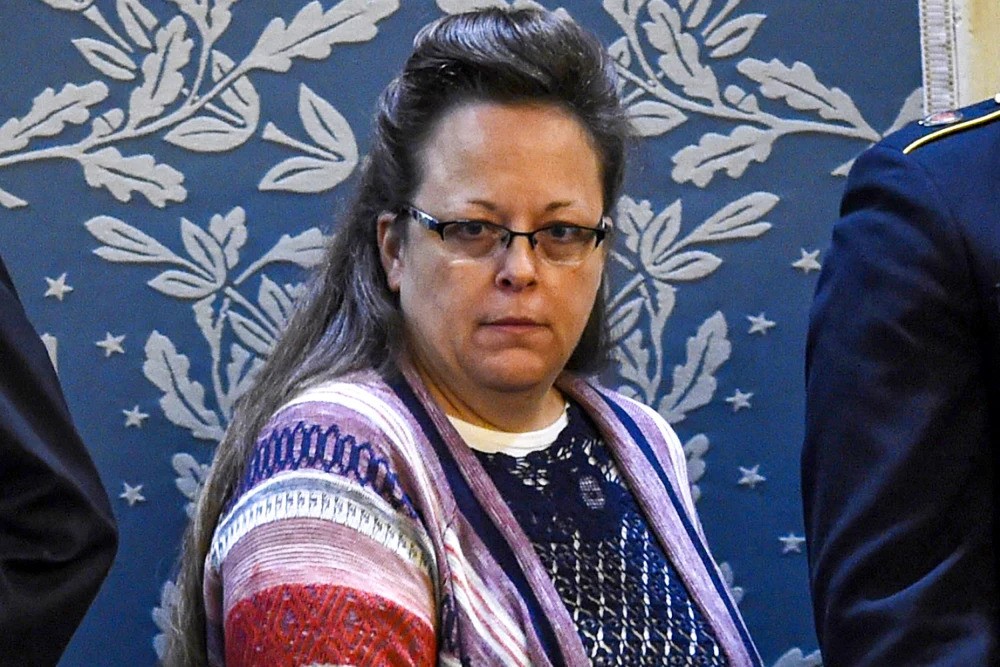
In a decision echoing across the nation like a cautious hymn, the Supreme Court on Monday declined to hear an appeal seeking to overturn Obergefell v. Hodges, the 2015 ruling that guaranteed the constitutional right of same-sex couples to marry.
The petition came from Kim Davis (yes, that same ole tired Kim Davis), the former Kentucky county clerk who famously refused to issue marriage licenses to same-sex couples after Obergefell was decided. Davis, who cited her religious beliefs in defiance of the law, now faces over $360,000 in damages and legal fees for denying constitutional rights to multiple couples. The high court, without explanation, refused to take up her appeal.
For the LGBTQ+ community, it was a sigh of relief, a brief reprieve from years of legal and political anxiety. “By refusing to revisit Kim Davis’ case the U.S. Supreme Court reaffirmed that marriage equality is not up for debate. We hope it remains that way and will remain vigilant in the pursuit of equity,” said Dr. David J. Johns, CEO and Executive Director, NBJC
“Today, love won again,” said Human Rights Campaign President Kelley Robinson in a statement following the decision. “When public officials take an oath to serve their communities, that promise extends to everyone—including LGBTQ+ people.”
Yet even as we celebrate, this victory must be held with cautious optimism. The Court’s denial of certiorari to Davis does not mean the fight is over, it simply means the Court, for now, will not reopen the question. Meanwhile, statehouses across the country are hard at work testing the edges of equality, introducing bills, resolutions, and legal maneuvers that could erode the foundations laid ten years ago.

The 6–3 conservative Court that overturned Roe v. Wade just three years ago is the same Court that declined to take up Davis’s appeal. That context matters. For many, it’s proof that Obergefell still has staying power; for others, it’s a reminder that no precedent is beyond challenge. The decision not to hear Davis’s case doesn’t create new legal protection, it simply preserves what already exists.
Justice Anthony Kennedy, who wrote the original Obergefell opinion, once described marriage as embodying “the highest ideals of love, fidelity, devotion, sacrifice, and family.” In 2015, his words illuminated the White House in rainbow light and opened courthouse doors to hundreds of thousands of couples who had waited a lifetime for recognition. But Kennedy is gone, as is Justice Ruth Bader Ginsburg. The Court that enshrined love into law is not the one we have today.
In their place stand Justices Brett Kavanaugh and Amy Coney Barrett, jurists whose records have raised alarm bells for LGBTQ+ advocates. Three sitting justices, Chief Justice John Roberts, and Justices Clarence Thomas and Samuel Alito were in dissent when Obergefell was decided, openly questioning its constitutional grounding. And conservative legal groups continue to call for the ruling’s reversal, framing marriage equality as a “judicial overreach” that must one day be corrected.
Even as the Supreme Court refuses to reopen Obergefell, several states have introduced or passed measures intended to restrict, redefine, or challenge same-sex marriage.
Resolutions urging reversal: Idaho and North Dakota have passed resolutions formally urging the Supreme Court to overturn Obergefell, echoing the language of right-wing advocacy groups that view the decision as illegitimate. While symbolic, these resolutions mark a dangerous escalation, an ideological invitation to re-litigate settled rights.
“Covenant marriage” bills: Missouri, Oklahoma, Tennessee, and Texas have each considered “covenant marriage” bills, designed to create a special legal category of marriage available only to opposite-sex couples. These bills would impose additional requirements, premarital counseling, stricter divorce provisions, and traditionalist vows to elevate heterosexual marriage as the moral standard. The effect, if enacted, would be a quiet segregation of marriage law: one set of rules for straight couples, and another for everyone else.
County-level obstruction: Even in the years following Obergefell, some counties, particularly in Texas and Alabama refused to issue marriage licenses altogether rather than extend them to same-sex couples. These defiant acts may seem isolated, but they represent the localized resistance that often precedes broader state-level restriction.
Together, these efforts reflect a coordinated attempt not to overturn equality outright, but to chip away at it, bill by bill, county by county, until the cracks begin to show.
Despite these threats, marriage equality remains the law of the land, fortified not only by Obergefell v. Hodges but also by the Respect for Marriage Act, passed by a bipartisan Congress in 2022. The Act ensures that all states must recognize marriages legally performed in other states, regardless of the gender of the spouses.
This means that even if a state attempts to ban or redefine same-sex marriage within its borders, it must still recognize the marriages of LGBTQ+ couples performed elsewhere. The Respect for Marriage Act effectively builds a federal safety net, one that cannot be easily undone without Congress reversing its own law.
Still, equality under law is not equality in practice. Recognition does not prevent discrimination. It does not shield couples from bureaucratic delay, moral judgment, or policy exclusion. It does not erase the danger of new “religious freedom” arguments being weaponized to deny services or benefits. Legal protection, while essential, is not the same as lived safety.
Why did the Court hold back this time? Legal experts suggest the absence of conflicting appellate decisions made the Davis case an unsuitable vehicle to revisit marriage equality. Additionally, even conservative justices have acknowledged that Obergefell created what is called widespread “reliance interests”millions of families and children whose legal and economic lives depend on its protection.
Justice Barrett recently noted that “very concrete reliance interests” are at stake when it comes to marriage. Justice Alito, while long critical of Obergefell, has conceded that it remains a “precedent of the Court” and should be treated with respect under the doctrine of stare decisis.
Still, neither statement guarantees longevity. As we learned from Roe v. Wade, precedent can fall under the right political conditions, and with the right case to challenge it.
For now, the Court’s silence is stability. But silence is not safety, rather, silence is merely postponement.
The truth is that LGBTQ+ rights in America remain in flux, swaying between progress and pushback. The Court’s refusal to hear Kim Davis’s appeal does not end the broader conservative campaign to roll back rights. It only pauses it.
To that end, three truths remain clear. First, the front lines are local. From county clerks to state legislators, the resistance to equality often begins below the national radar. It’s there, in the less-covered votes and procedural maneuvers, that discrimination hides and mutates.
Second, the law is both shield and target. While the Respect for Marriage Act and Obergefell serve as vital protections, they are also what conservative legal strategists are trying to erode, testing the limits of federal recognition and judicial precedent through small, calculated challenges. And, lastly, public vigilance is the final safeguard. Marriage equality did not materialize from judicial benevolence, it was won through generations of activism, heartbreak, and organizing, and maintaining it will require the same.
When Justice Kennedy wrote his opinion a decade ago, he wasn’t just ruling on a case, he was describing a vision of love as a civic right, a moral constant, and a human necessity. That vision endures, though its guardians have changed.
So today, we can say, love won again. But we must also say, love is still under attack.
As queer and trans people, as lovers and fighters, we know the rhythm of this dance too well, two steps forward, one back, another step forward again. Progress in America is never guaranteed; it is fought for, protected, and re-imagined daily.
The Court’s decision may mark a reprieve, but not a resting place. The work continues, the organizing continues and the vigilance must continue.
Because love, in the face of power, must not only survive. It must endure.